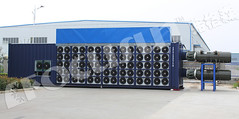
- Click Here To Find Out More About:
- Buy Glycol Chiller
byAlma Abell
When Charleston HVAC professionals work on heating and cooling systems, most also offer to test the home air. That might seem like an unusual job for repair technicians, but, in fact, it is closely tied to their work. Studies show that indoor air is often polluted and can cause health problems.
Since modern HVAC systems are designed to filter air as well as cool or heat it, professionals like Preferred Home Services are now trained to evaluate air quality. They also educate clients about the problem and offer a range of solutions.
Why Indoor Air Checks Matter
Most HVAC professionals offer Indoor Air Quality Testing in Charleston SC as a result of EPA reports. The environmental agency states that an average home can include indoor air that is up to 5 times more polluted than the air outside of it.
Home air is considered polluted when it contains toxins related to health issues. The problem has been associated with breathing problems, eye and nose irritation and cardiovascular issues.
What Technicians Look for During Tests
During Indoor Air Quality Testing in Charleston, SC specialists check homes signs of common irritants that tend to accumulate. In modern, well-insulated homes, pollutants such as dust mites, chemicals, pet dander and mold often get trapped and linger in the air.
HVAC specialists look for signs of pesticides and formaldehyde used in some building materials. Their tests also identify lead, tobacco residue and particulates caused by fireplaces. These are just some of the substances that cause problems when they are carried through vent systems.
How Technicians Help Improve Indoor Air
Once HVAC experts detect poor air quality in a home, they offer a variety of solutions. Technicians often begin by suggesting that customers ban smoking, use exhaust fans and open windows. They may recommend bathing indoor pets and switching to microfiber cleaning cloths. Technicians also offer options like air cleaners, high-performance filters and UV light filtering systems.
Indoor air quality checks are often routine parts of HVAC service. Technicians offer the service so that they can identify pollutants that could lead to health problems. If they find issues, professionals offer a range of solutions that can include filtering equipment.